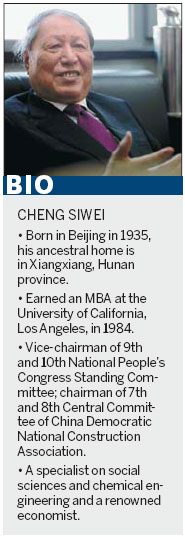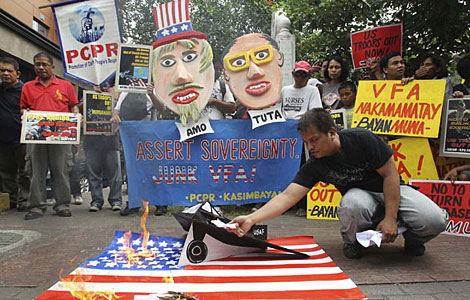|
|||||||||||
BEIJING - A former senior legislator has proposed that the authorities adjust interest rates to prevent inflation from eroding savings.
Cheng Siwei, former vice-chairman of the Standing Committee of the National People's Congress, the top legislature, also said that the government must use legislation to resolve an increasing number of mass incidents, or protests, rather than trying to "stifle" them.
|
 |
There have been negative real interest rates for the last 23 months, the longest period in a decade. Inflation last year was up 5.4 percent from 2010, much higher than the 3.5 percent one-year deposit rate, according to the National Bureau of Statistics.
"China has maintained the lowest interest rate among major developing countries," the prominent economist told China Daily.
"Banks have fluctuated loan rates but not for deposits, and thus they are raking in huge profits while the people are not."
The statistics agency said that the consumer price index (CPI), a key gauge of inflation, rose 4.1 percent in December, the lowest growth in 15 months, sparking some rosy predictions.
"For this year we expect CPI to moderate further," Reuters quoted Dongming Xie, economist at OCBC Bank in Singapore, as saying. "The negative real interest rate is likely to be corrected in the second quarter of this year."
But Cheng said he anticipated that China's inflation rate would remain above 5 percent in 2012, citing surging oil prices, rising labor costs and, particularly, money supply as factors.
Although the government is pursuing a prudent monetary policy in 2012 it may not tighten money supply too much as it has to sustain development of smaller and micro businesses while completing a large number of ongoing projects, he said.
This means inflation will be higher than interest accrued on bank deposits.
"The banks should feel embarrassed by earning money this way," Cheng said. "Just like they are fluctuating loan rates, banks should make interest rates variable."
India was the first to have market-oriented interest rates among developing countries, Cheng said. "If deposit interest rates fluctuate, there will be more intense competition among banks to attract clients."
Cheng, however, highlighted a dilemma: while raising benchmark deposit interest rates helps subdue inflation and reverse negative interest rates, it could also put enterprises and local governments in dire financial straits.
And rising interest rates would also attract an inflow of "hot money", speculative capital.
"China's economy has seen a slowdown, but banks are still making huge profits. It is time for the government to consider fairer distribution between banks and people," Cheng said.
Wei Jianing, deputy head of the macroeconomic research department at the Development Research Center of the State Council, attributed local government debt risk to the locked interest rates mechanism.
"Negative interest rates restrain effective capital resource allocation and boost the illegal private lending market," Wei said.
Tackling social unrest
Commenting on the latest large-scale village protest against local authorities in Wukan village in Guangdong province, the former senior legislator said that the incident sounded alarms for the government.
"The government must perform in line with the law, and the public must be provided adequate avenues for them to express appeals," Cheng said.
Wukan residents protested in September against village authorities over issues related to land use, financing and elections, according to a Xinhua News Agency report. The protests turned violent and triggered public concern in China.
Wukan villagers gathered again on Dec 11 after Xue Jinbo, who was seen as the organizer of a November demonstration, died in police custody, it said.
According to the People's Daily, the dispute escalated due to the failure of local officials to answer the public's appeals in a timely manner.
The Wukan dispute apparently reached a settlement as the village set up a new Party branch and a work team on Jan 15 to prepare for the re-election of the village committee, according to the Xinhua report.
"To deal with protests it is important for the authorities to adopt a more pacific method," Cheng said. "Conflicts will often escalate if the authorities try to stifle or even repress the situation."
Every year, there are people traveling long distances to Beijing to lodge their complaints and grievances. Some are stopped by local authorities.
"It is absolutely wrong," Cheng said.
Under the rule of law, a resident is entitled to sue an official. Granting this right will surely reduce the number of protests, he said. "Blocking them is by no means a solution. Rather, addressing their grudges, according to the law, is the way out.
"Why do they bother to go to the trouble of coming to Beijing? Because they do not believe in local authorities," he said.
It is imperative for local governments to balance equality and efficiency in the course of pursuing economic growth, Cheng said.
Cheng said land is the lifeline of farmers. Illegal land grabs are often at the root of an increasing number of protests in China.
The country is updating its Land Management Law to better protect farmers' interests in land expropriations.
Chen Jia contributed to this story.
Hot Topics
Kim Jong-il, Mengniu, train crash probe, Vaclav Havel, New Year, coast guard death, Internet security, Mekong River, Strait of Hormuz, economic work conference
Editor's Picks

|

|

|

|

|

|







